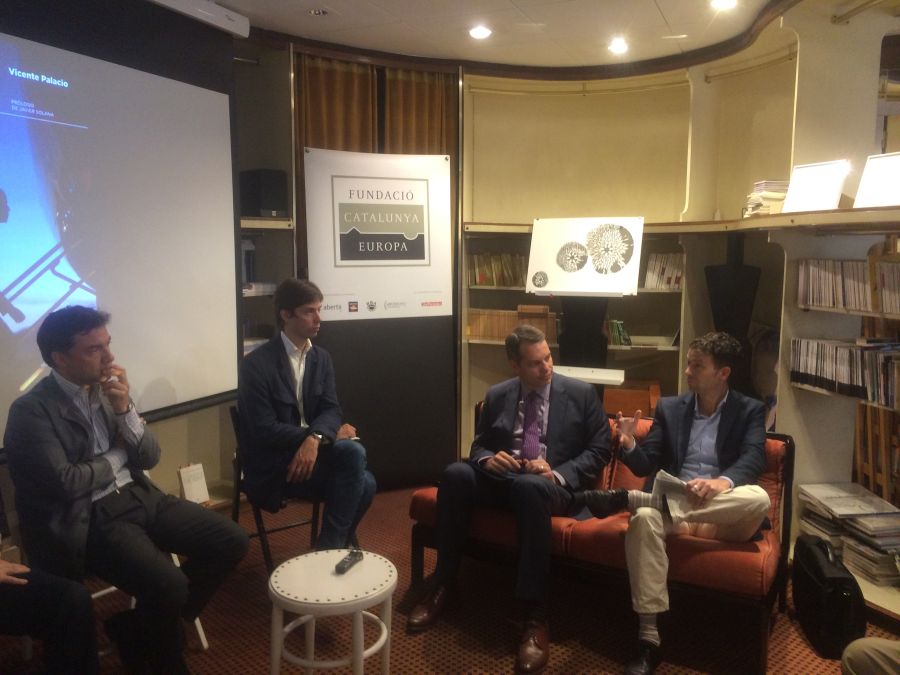The Catalonia Europa Foundation and the Nollegiu bookstore organized, last night, the presentation of the book "After Obama: United States in no man's land", by Vicente Palacio, director of the Observatory of Foreign Policy of the Alternativas Foundation. The act was accompanied by a debate where the author of the book talked about the relations between Europe and the United States with Marcos Mandojana, US Consul General in Barcelona and Juan García, expert of ATTAC Catalonia in the Transatlantic Trade and Investment Treaty (TTIP). Pere Almeda, member of the Executive Committee of the Foundation, moderated the event. During the debate, one of the topics analyzed was the negotiation of the trade agreement between the United States and the European Union. Vicente Palacio predicted that the approval of this would be difficult, due to the crisis and the political situation of the continent.
Almeda reviewed the main challenges faced by the Obama Administration. Among these, the outbreak of the financial crisis, the Arab springs and the war in Syria, the relations with Russia and Iran, and the negotiation of the TTIP with the EU. Almeda gave special importance to the economic crisis and its consequences, which will remain present after the departure of Obama: "inequality has increased, and marginal areas in the country." And populist candidates like Donald Trump seem to reap the rewards of social unrest. The event is part of the Club Europe program. Along with Almeda, members of the Executive Committee are Jordi Angusto, Francesc Colomé, Max Vives-Fierro and Gemma Sendra, president of the body.
The situation in the United States is uncertain. So much so, that Palacio wondered if the "country is in decline". The director of the Observatory of Foreign Policy ruled out that this was the case: "The US is not so much in decline as in transformation, trying to find its place in a world that has changed." Palacio recalled the context in which Obama arrived at the White House. As for the management of the crisis, he said that the reforms of the financial system of the democratic executive, such as the "Dodd-Frank Law", could have been more daring. In addition, "later, with the arrival of the Republican majority in Congress it was more difficult to move forward". That same parliamentary blockade "forced Congress to renegotiate Obamacare and to be less ambitious with social policy." The result, he advanced, is a partial exit from the crisis, marked by inequality.
Foreign policy, he said, had to bear the dead weight of conflicts in which the United States had unnecessarily engaged, such as the Iraq and Afghanistan Wars. Washington, moreover, met with multiple fronts. Since the fall of Gaddafi, where "Europe did not have a plan B to manage the situation [if it went wrong]" until the rise of China, going through "the rivalry between Sunnis and Shiites" in the Middle East. All this, with "the absence of the EU" in foreign policy. Obama, therefore, opted for a cautious foreign policy, rejecting large-scale interventions, even in the case of the Islamic State: "He has been criticized for not seeing Isis as an existential threat, but he has done it with climate change, for the wars it can unleash".
Regarding the negotiation of the TTIP, Palacio was skeptical about the possibilities of approving the agreement. Among other reasons, because with full crisis it is more difficult to put it into practice: "The Juncker Plan, with its investments, is the priority for Europe, not a treaty like the TTIP". "Trade may be interesting for growth, but European parliaments will not approve it," he added. To the rejection of part of the community citizenship are the criticisms on the other side of the Atlantic, against the precedent of other major agreements, such as the free trade agreement between Mexico, the US and Canada (NAFTA): "there are studies that say that They lost three million jobs".
Marcos Mandojana, US Consul General in Barcelona, ??was more optimistic: "Obama did not support the big trade agreements when he was a senator, but when he entered the White House he saw the advantages." By Mandojana, there are many reasons to sign it. Among them, guarantee the leadership of the US and the EU when it comes to establishing the standards of international trade, two regions that "make up a good part of world GDP," or "lighten the regulation of SMEs". The Consul General assured that "The US and the EU do not want to lower environmental or health standards with negotiation". He added that "it has been the most transparent negotiation that has been made" to date.
Juan Garcia, member of ATTAC Catalunya and expert in the TTIP, was skeptical of the growth expectations generated by the treaty. And he put as background the NAFTA: "Growth slowed down in Mexico after its launch, the background is not good". He assured that "the jobs that are created after a trade agreement are unstable". And he warned against the pressure of large companies in this type of agreement.
In response to the interventions of Garcia and Mandojana, Palacio predicted that "the opacity in trade agreements are running out", but warned against the "economic nationalism" that may arise in its place. He said that trade agreements can be beneficial for the population, but noted that "we must talk about who are the winners and the losers" in their negotiation.












